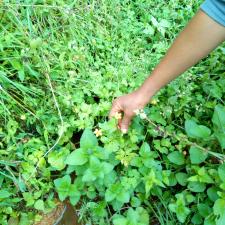Traditional medicinal plant relieves malaria symptoms

A tea made from the leaves of the Ranunculus multifidus, a member of the buttercup family, is used in some parts of Africa to treat malaria. "So far it was not known which ingredients the plant has and which of them might have a healing effect," says Professor Kaleab Asres from AAU, who had been aware of the use of the plant and initiated the study.
The pharmacists produced extracts from the plant leaves and tested their effectiveness on mice: "We infected the animals with the Plasmodium berghei parasite, which causes malaria in certain rodents including mice. In humans, malaria is caused by related species of plasmodia," explains Betelhem Sirak from AMU. Some of the mice received chloroquine, an established and effective drug for treating malaria. Others were given different doses of the plant extract. The experiments were carried out in accordance with internationally recognised guidelines for the keeping and care of laboratory animals.
The results were promising: "Although the extracts did not work as well as chloroquine, they nevertheless had a clearly positive effect on the course of the disease. For example, the mice lost significantly less weight and their body temperature was also more stable than without treatment," says Professor Peter Imming from MLU.
The researchers found the active ingredient anemonin in the plant extracts. "Ranunculus multifidus does not actually contain it. Anemonin is formed when the plant is injured, for example when it is crushed and the inside of its cells comes into contact with air," continues Imming. This is probably why the extracts that were prepared in this way worked best.
The team suspects that, like chloroquine, anemonin affects the parasite’s metabolism, though it probably attacks it at a different location. That would be good news, because plasmodia have developed resistance to chloroquine in some areas of East and West Africa. "Anemonin could have the potential to circumvent this resistance," says Imming. However, this requires a number of further studies in order to decipher the exact mechanism of action and to increase its effectiveness. If these tests are successful, clinical studies will follow over several years to confirm its effectiveness in patients.
Using pathogens in a test tube, the researchers investigated whether Ranunculus multifidus can also help combat other diseases for which it is traditionally used. They tested anemonin on bacteria similar to tuberculosis, but found it was ineffective - a result that is not all too disappointing for the pharmacists. As Imming explains: "A substance that attacks all types of cells would also attack human cells - and is therefore a poison."
The researchers examined the effectiveness of anemonin on the widespread parasite species leishmania and schistosoma in a further study which was recently published in "Molecules". Initial laboratory tests also showed promising results.
The studies were supported by the School of Graduate Studies of AAU, by the Deutsche Forschungsgemeinschaft (DFG, German Research Foundation) and by the projects PhytoWoodSynergies and Trisustain of the Federal Ministry of Education and Research.
Studies: Sirak B. et al., In Vivo Antimalarial Activity of Leaf Extracts and a Major Compound Isolated from Ranunculus multifidus Forsk. Molecules (2021). doi.org/10.3390/molecules26206179
Sirak B. et al., In Vitro Antileishmanial and Antischistosomal Activities of Anemonin Isolated from the Fresh Leaves of Ranunculus multifidus Forsk. Molecules (2021). doi.org/10.3390/molecules26247473

